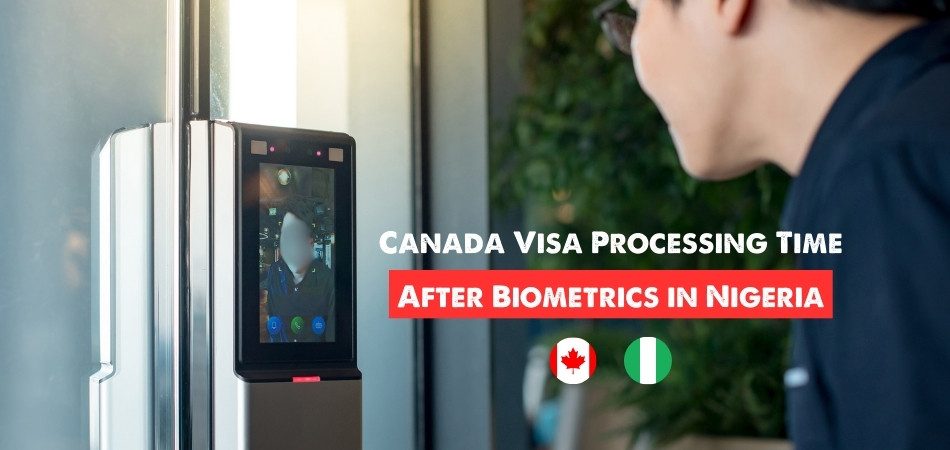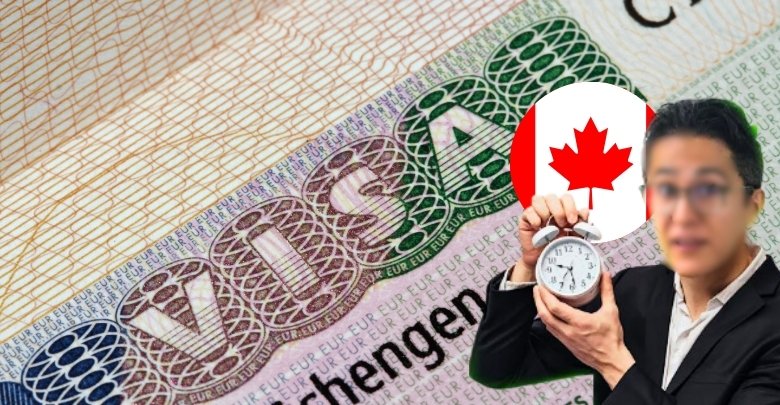It can be challenging to obtain a Canadian visa, especially when you are applying from Nigeria. One of the most crucial stages in this step is the biometric process, which is a key element in securing your travel or residency documents. As you go through this process, knowing the ‘Canada visa processing time after biometrics in Nigeria’ becomes crucial. Applicants should know this timeframe so that they can plan accordingly.
Typically, after biometrics are taken, it takes about 3 to 8 weeks for the visa to be processed. This timeframe can vary depending on factors such as the volume of applications, the complexity of individual cases, and the specific visa category.
To ensure you have the most accurate and up-to-date information, it’s advisable to check official sources regularly. Follow the rest of the article to learn more about the application process and tips to expedite your visa approval.
Does Canadian Visa Processing Time Vary By Country?
Yes, the processing time for a Canadian visa can vary by country. Each embassy or consulate handles applications differently based on local logistics. For instance, some countries may process visas quicker due to more staff or better technology. Others might take longer, especially in places with higher application volumes.
Countries with fewer applicants often enjoy faster processing times. This is because fewer applications mean less paperwork for consular officers to review. Conversely, nations with many prospective visitors to Canada might experience delays. It’s a simple matter of how many people are applying from that location.
Remember, the timeline can differ not just country to country, but also city to city within the same nation. Larger cities may have more resources to handle applications swiftly. However, they also tend to receive more applications, which can offset this advantage. Smaller consulates might process applications faster simply because they receive fewer.
Canada Visa Processing Time After Biometrics in Nigeria
The process of obtaining a Canadian visa can be challenging, especially when it comes to knowing the timeline. In Nigeria, after you’ve completed your biometrics, the typical Canada visa processing time after completing biometrics ranges from 3 to 8 weeks. However, this timeframe can vary based on several factors and is not set in stone. Here is a detailed explanation of it:
Application Volume
High application volumes can lead to longer processing times. During peak travel seasons, the number of applicants increases significantly. This surge can slow down the overall speed of visa processing. It’s a common scenario that affects many consulates globally.
Case Complexity
Some visa applications are more complex than others. If your case involves intricate details or unusual circumstances, it might take longer to review. Complexity often requires additional scrutiny and verification. Each intricate detail can add time to the processing period.
Visa Category
Different visa categories are processed at different speeds. Student visas might be expedited to align with school start dates. Work visas require additional checks that might lengthen the process. Each category follows its own set of rules and timelines.
Staffing Levels
The number of staff at the consulate can impact processing times. Well-staffed consulates can handle applications faster than understaffed ones. Changes in staffing, due to holidays or other reasons, also affect processing speeds. It’s a factor that varies without much public visibility.
Technical Systems
The efficiency of the technical systems used by the consulate plays a role. Advanced technology can speed up the processing of applications. Technical issues, however, can cause delays. Regular updates to these systems can also temporarily slow down processing.
Local Holidays and Strikes
Local holidays can cause the consulate to close temporarily, delaying processing. Strikes or other local disruptions also impact how quickly applications are processed. These events are often unpredictable but have a direct effect on visa issuance.
Consular Jurisdiction
Some consulates handle a larger geographic area or population. These jurisdictions might experience longer processing times due to the sheer volume of work. Conversely, smaller jurisdictions might process visas more quickly due to fewer incoming applications.
Knowing these factors can help set realistic expectations for those applying for a Canadian visa in Nigeria. Each element plays a crucial role in how quickly you can receive your visa and begin your journey to Canada.
How to Track Your Canada Visa Status After Biometrics Submission in Nigeria?
After completing your biometrics, you should stay informed about what comes next in the visa process to avoid unnecessary confusion or delays. In that case, knowing the next steps after biometrics for Canada visa is essential for planning accordingly and reducing anxiety during the waiting period. Keeping track of your Canada visa status after submitting biometrics in Nigeria is crucial to staying on top of the status of your application. Here’s a step-by-step guide to help you track your visa status efficiently:
Step 1: Access the Official IRCC Website
Start by visiting the official website of Immigration, Refugees and Citizenship Canada (IRCC). This site is the primary source for all visa-related inquiries. You’ll find up-to-date information and the tools needed to track your visa application. Ensure you have your application number handy.
Step 2: Log In to Your Account
Create an account on the IRCC website if you haven’t already. Returning users should log in using their credentials. This account is vital for accessing personalized information about your visa status. It’s a secure way to keep track of your application.
Step 3: Enter Your Application Details
Once logged in, navigate to the section labeled ‘Check application status’. Here, you’ll need to enter your application number and other required details. These details help the system identify and retrieve your application status accurately.
Step 4: Check Your Email Regularly
IRCC often sends updates via email. Ensure your email address is correct in your profile to receive these updates. Checking your email regularly ensures that you don’t miss any important notifications about your visa application.
Step 5: Use the IRCC Web Form for Queries
If you encounter issues or do not see updates, use the IRCC Web Form to contact the support team. This form allows you to submit specific questions directly to IRCC officials. Be precise and clear in your query to get the most helpful response.
Step 6: Stay Updated with Processing Times
Finally, familiarize yourself with the standard processing times for your visa category on the IRCC website. Knowing these times can help you gauge when you might expect a decision on your application. Keep in mind that these are estimates and can vary based on many factors.
What Happens if There Are Delays in Your Canada Visa Processing After Biometrics?
When applying for a Canadian visa, delays can occur even after biometrics have been submitted. So knowing the typical Canada visa processing time after biometrics is helpful, as these hold-ups might impact your travel plans. Below is what to expect and how to deal with it by managing the situation effectively.
Initial Delay Confirmation
First, confirm if there’s actually a delay in your visa processing. Check the current processing times on the IRCC website to compare. If your application exceeds these times, it’s considered delayed. This can be due to various administrative reasons.
Communication from IRCC
If there’s a delay, IRCC may contact you. They will inform you about the delay and possibly explain the reason. Check your email regularly, including spam folders, for any communication. Keep your contact information up to date to ensure you receive all notifications.
Inquire Directly for Updates
You can also inquire directly about your application’s status. Use the online account you created for application submission to check updates. Alternatively, contact the Visa Application Centre for direct information. Patience is key, as responses may not be immediate.
Adjust Your Travel Plans
Delays might require you to adjust your travel plans. Consider postponing your travel dates if visa approval is uncertain. Notify any affected parties, like employers or schools, about your situation. Flexibility will help reduce stress during this period.
Legal or Advisory Consultation
If delays extend significantly, consulting an immigration lawyer or a visa consultant might be beneficial. They can offer advice specific to your case or help expedite the process. Ensure that any advice or action taken is based on reputable sources and professional guidance.
Delays in visa processing are not uncommon, but they can be managed with the right approach and information. Stay informed, maintain communication with IRCC, and adjust plans as needed to accommodate these unforeseen changes in your visa application process.
Tips for Reducing Processing Time for Your Canadian Visa from Nigeria
Applying for a Canadian visa from Nigeria can sometimes be a lengthy process. Fortunately, there are strategies to help streamline and potentially speed up the processing time. Implementing these tips can make a significant difference in how quickly you receive your visa.
- Complete Application Correctly: Ensure every part of your visa application is filled out correctly. Mistakes can cause delays, requiring additional time to correct them.
- Submit All Required Documents: Provide all necessary documents in the correct format as specified by the Canadian Embassy. Missing documents lead to requests for additional information, slowing down processing.
- Use Online Submission: Opt for online applications over paper submissions. Online forms are processed faster as they reach officials immediately.
- Early Biometrics Appointment: Schedule your biometrics appointment as soon as you receive the instruction letter. Early completion can significantly expedite the overall processing.
- Off-Peak Application: Apply during off-peak times if possible. Less application traffic can lead to quicker processing times.
- Check for Local Holidays: Be aware of local and Canadian public holidays. These can affect embassy operating days and lead to processing delays.
- Regular Status Updates: Regularly check your application status online to address any issues promptly. Staying informed helps you respond quickly to any additional requests.
- Professional Help: Consider consulting a visa expert or agency. Their experience can help ensure that your application is as efficient as possible.
By following these tips, you can improve the efficiency of your visa application process and reduce potential delays. Stay proactive and organized to enhance your chances of a smooth and quick Canadian visa approval from Nigeria.
FAQs About Canada Visa Processing Time After Biometrics in Nigeria
The timeline for processing the Canada visa after biometrics is crucial for Nigerian applicants. Several factors affect processing times, so the step-by-step process can sometimes seem confusing. Here are some commonly asked questions and detailed answers to help you get through the process smoothly:
Do I Need to Submit My Passport Immediately After Biometrics?
No, you typically submit your passport only after receiving a request from the visa office. This usually happens when your application is approved or when further verification is required. Ensure your passport is valid for the duration of your stay in Canada.
Does the Type of Visa Affect the Processing Time After Biometrics?
Yes, different types of visas (e.g., visitor, study, work) can have different processing times. It is important to check the specific processing times for your visa category on the IRCC website to get an accurate estimate.
What Happens if My Biometrics Expire Before My Visa Is Processed?
Biometrics are generally valid for 10 years. If they expire before your visa application is processed, you will be required to provide new biometrics. The visa office will inform you if this is necessary, and you may need to schedule a new biometrics appointment.
Can I Travel to Canada While My Visa Is Being Processed?
No, you must wait until your visa is officially approved and stamped in your passport before traveling to Canada. Traveling without a valid visa can lead to entry denial and complications with your travel plans.
What Documents Are Required for The Visa Submission After Biometrics?
Typically, you will need to submit your passport, a recent photograph, and any additional documents requested by the visa office. Make sure to follow the specific instructions provided by the visa office for document submission.
Are There Any Additional Fees for Processing After Biometrics?
Generally, there are no additional fees specifically for processing after biometrics. However, ensure all required fees for your visa application are paid and check the IRCC website for any updates on fee structures.
Can I Apply for A Different Type of Visa While Waiting for My Current Visa Decision?
Yes, you can apply for a different type of visa while waiting for the decision on your current application. However, ensure that you meet all the requirements for the new visa and understand how it may impact your existing application.
Final Thoughts
Patience and attention to detail are essential for managing the visa application process. Applicants must ensure that all forms are accurately completed and all necessary documents are submitted. Staying informed about the steps involved in the process can greatly alleviate stress.
There are several factors that can affect the “Canada visa processing time after biometrics in Nigeria”. Some of these factors include the volume of applications and the complexity of individual cases. Applicants are encouraged to regularly check official resources to stay updated on any changes. This proactive approach helps in planning and adjusting expectations accordingly.
It is also recommended that applicants remain flexible in their travel plans to accommodate potential delays. Be sure to follow up regularly with IRCC and keep an eye on their communication. By staying organized and informed, applicants can maximize their chances of a smoother visa processing experience.








